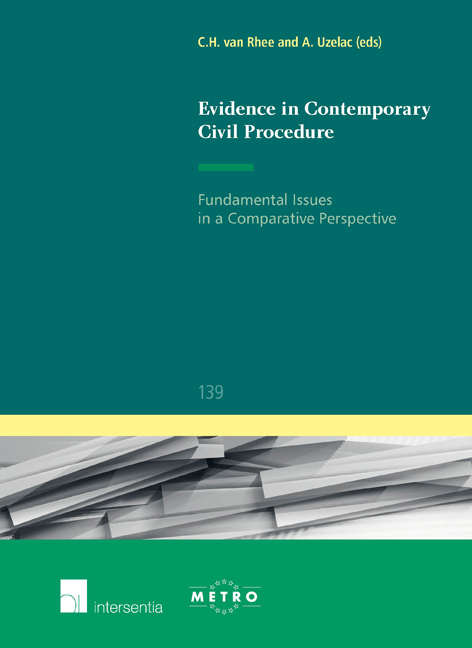Book contents
- Frontmatter
- Contents
- List of Authors
- Acknowledgements
- INTRODUCTION
- FUNDAMENTAL AND OTHER PRINCIPLES OF EVIDENCE IN CIVIL LITIGATION
- EVIDENCE AND THE PRINCIPLE OF PROPORTIONALITY. HOW TO GET RID OF EXPENSIVE AND TIME-CONSUMING EVIDENCE?
- DISCLOSURE OF DOCUMENTS IN CIVIL PROCEDURE: THE PRIVILEGE AGAINST SELFINCRIMINATION OR A QUEST FOR PROCEDURAL FAIRNESS AND SUBSTANTIVE JUSTICE
- PRECLUSION OF LATE ALLEGATIONS AND EVIDENCE AS A TOOL TO INCREASE THE EFFICIENCY OF CIVIL PROCEEDINGS IN POLAND: A SHORT STORY OF THE UGLY PAST AND THE WAY TO A BRIGHT FUTURE
- THE ‘RIGHT TO PROOF’ AND THE ‘LOYALTY PRINCIPLE’: A FRENCH PERSPECTIVE
- RESTRICTIONS ON THE ADMISSIBILITY OF EVIDENCE
- TAKING LENIENCY DOCUMENTS AS EVIDENCE IN DAMAGES ACTIONS IN CASES OF COMPETITION LAW INFRINGEMENT
- LOST IN TRANSLATION? LANGUAGE DIFFERENCES AND THEIR IMPACT ON EVIDENCETAKING IN LITIGATION
- EVIDENCE, INFORMATION TECHNOLOGY AND PRINCIPLES OF CIVIL PROCEDURE – THE HUNGARIAN PERSPECTIVE
- THE POTENTIAL IMPACT OF ELECTRONIC PROCEEDINGS ON TRADITIONAL PRINCIPLES OF CIVIL PROCEDURE – THE SLOVENIAN EXPERIENCE
- TYPES OF EVIDENCE IN CIVIL LITIGATION
- EVIDENCE IN ARBITRATION AND NATIONAL CIVIL LITIGATION
- REGISTRAR
- EVIDENCE IN CROSS BORDER CIVIL LITIGATION
- IUS COMMUNE EUROPAEUM
TAKING LENIENCY DOCUMENTS AS EVIDENCE IN DAMAGES ACTIONS IN CASES OF COMPETITION LAW INFRINGEMENT
from FUNDAMENTAL AND OTHER PRINCIPLES OF EVIDENCE IN CIVIL LITIGATION
Published online by Cambridge University Press: 15 December 2017
- Frontmatter
- Contents
- List of Authors
- Acknowledgements
- INTRODUCTION
- FUNDAMENTAL AND OTHER PRINCIPLES OF EVIDENCE IN CIVIL LITIGATION
- EVIDENCE AND THE PRINCIPLE OF PROPORTIONALITY. HOW TO GET RID OF EXPENSIVE AND TIME-CONSUMING EVIDENCE?
- DISCLOSURE OF DOCUMENTS IN CIVIL PROCEDURE: THE PRIVILEGE AGAINST SELFINCRIMINATION OR A QUEST FOR PROCEDURAL FAIRNESS AND SUBSTANTIVE JUSTICE
- PRECLUSION OF LATE ALLEGATIONS AND EVIDENCE AS A TOOL TO INCREASE THE EFFICIENCY OF CIVIL PROCEEDINGS IN POLAND: A SHORT STORY OF THE UGLY PAST AND THE WAY TO A BRIGHT FUTURE
- THE ‘RIGHT TO PROOF’ AND THE ‘LOYALTY PRINCIPLE’: A FRENCH PERSPECTIVE
- RESTRICTIONS ON THE ADMISSIBILITY OF EVIDENCE
- TAKING LENIENCY DOCUMENTS AS EVIDENCE IN DAMAGES ACTIONS IN CASES OF COMPETITION LAW INFRINGEMENT
- LOST IN TRANSLATION? LANGUAGE DIFFERENCES AND THEIR IMPACT ON EVIDENCETAKING IN LITIGATION
- EVIDENCE, INFORMATION TECHNOLOGY AND PRINCIPLES OF CIVIL PROCEDURE – THE HUNGARIAN PERSPECTIVE
- THE POTENTIAL IMPACT OF ELECTRONIC PROCEEDINGS ON TRADITIONAL PRINCIPLES OF CIVIL PROCEDURE – THE SLOVENIAN EXPERIENCE
- TYPES OF EVIDENCE IN CIVIL LITIGATION
- EVIDENCE IN ARBITRATION AND NATIONAL CIVIL LITIGATION
- REGISTRAR
- EVIDENCE IN CROSS BORDER CIVIL LITIGATION
- IUS COMMUNE EUROPAEUM
Summary
Introduction
Taking evidence in competition cases is particularly delicate since companies are careful to hide any evidence that may prove wrongdoing on their part. This is due to the severe penalties that are prescribed for infringement of competition rules. This problem is especially acute in cartel cases, and consequently competition authorities use different methods to detect and prove cartel activities. One of the most effective methods that is currently used to fight cartels is the leniency programme, whereby companies that provide information about the cartel in which they participate may receive full or partial immunity from fines. In addition to fines that can amount to up to 10 per cent of the total turnover of the company in the preceding business year, companies are liable for the civil consequences of the competition law infringement (e.g. damages) as well. Claims for compensation for damages caused are made before national courts in private law actions from which there is no immunity under the leniency programme. Private law actions in competition cases have been acknowledged as highly important in recent years, and the EU Commission stimulates such private enforcement, which is still low in the EU as compared with the USA. This ‘improvement’ of private enforcement, however, requires adequate access to information, essential for preparing lawsuits by the private damages claimants, that is in the possession of the defendants and competition authorities.
Since competition authorities, including the EU Commission, are bound by the rule of confidentiality of sensitive documents, which is part of the leniency programme as well, the question is how to adequately protect the individual interests of victims, on the one hand, and not jeopardise the effectiveness of the leniency programme, on the other hand. The Court of Justice of the European Union (CJEU) and the General Court tackled this issue in several cases that will be analysed in this article. As a result of the decisions made in these cases, case law does not favour leniency applicants entirely, while Directive 2014/104/EU takes the opposite view. Finally, this article explores how this issue is handled in Slovenia, and its compatibility with EU law. So far, there is no recorded case that refers to the disclosure of leniency documents in the Republic of Slovenia.
- Type
- Chapter
- Information
- Evidence in Contemporary Civil ProcedureFundamental Issues in a Comparative Perspective, pp. 105 - 124Publisher: IntersentiaPrint publication year: 2015



